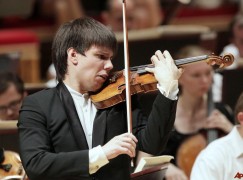Here are the plans, just announced, for the Los Angeles Philharmonic Orchestra’s centennial. Watch out also for a world premiere of Steve Reich’s Music for Ensemble and Orchestra, conducted by Susanna Mälkki.
Highlights:
– Premieres of over 50 commissions – the LA Phil’s unprecedented investment in music’s future
– 20 programs conducted by Dudamel, ranging from the world premiere of John Adams’ piano concerto with Yuja Wang as soloist to a climactic performance of Mahler‘s monumental “Symphony of a Thousand” in its Walt Disney Concert Hall premiere
– Cross-disciplinary collaborations with Benjamin Millepied, L.A. Dance Project and American Ballet Theatre for Romeo and Juliet; LA Phil Artist-Collaborator and MacArthur Fellow Yuval Sharon for exceptional performances of Meredith Monk’s ATLAS and John Cage’s Europeras 1 & 2; composer-conductor Christopher Rountree and the Getty Research Institute for an ongoing Fluxus festival; and Barry Edelstein and The Old Globe for The Tempest
– The return of former LA Phil Music Directors Esa-Pekka Salonen and Zubin Mehta, plus a new work by former Music Director André Previn, along with special programs by former Principal Guest Conductor Michael Tilson Thomas
– Major events include the 11-day eclectic season kick-off LA Fest, a Fluxus Festival and a multi-part Stravinsky focus led by Esa-Pekka Salonen
– Programs celebrating the relationship between movies and music, pairing the orchestra with screenings of excerpts from Stanley Kubrick’s masterpieces and a celebration of scores by John Williams
– Appearances by internationally celebrated musicians, including Emanuel Ax, Daniel Barenboim, Andrew Bird, Yefim Bronfman, Lila Downs, Mirga Grazinytė-Tyla, Hélène Grimaud, Marc-André Hamelin, LA Phil Creative Chair for Jazz Herbie Hancock, Lang Lang, La Santa Cecilia, Audra McDonald, Moby, Anne-Sophie Mutter, Murray Perahia, Bernadette Peters, Itzhak Perlman, Cécile McLorin Savant and many more
Gustavo Dudamel said: “I have been thrilled to help define and shape the LA Phil over the past decade of our great history, when we have worked with such enthusiasm to make ourselves more diverse, more inclusive, and more engaged with our community, while pushing ourselves every day to make music that is magnificent and courageous. This Centennial season, which focuses so strongly on artistic breakthroughs and inspired educational projects, such as our new YOLA center, is going to carry us forward with new momentum.”
Simon Woods said: “The LA Phil has earned the reputation of being the orchestra that dares to do more, whether it’s for the diverse range of today’s composers or for the fast-changing communities that we work within and serve. As I look ahead toward this Centennial season, I feel that Gustavo and the artistic team have not just stood by the wager they’ve made on boldness and innovation but have doubled down on it. LA Phil 100 is indeed a celebration of everything that has led us to this moment – but, more importantly, it is a new beginning for wonderful things to come for this great orchestra and those who are inspired by its music making.”

The British cellist Robert Cohen has announced he is leaving the Fine Arts Quartet after six years to resume his solo career.

His replacement is the German veteran, Niklas Schmidt, formerly of the Fontenay Trio.
Schmidt is the quartet’s fourth cellists in 72 years. There have been 10 viola replacements.
There was outrage last week when SAS Scandinavian Airlines began charging an extra 50 Euros to book a cello, in addition to the extra seat.
Now SAS have told Jacob Shaw, who led the outcry, that it was all an administrative error: ‘A mistake has happened here. If you book a seat for your instrument, you shouldn’t have to pay an extra fee. If it’s not possible to book online we will not charge you an extra fee.’
Jacob says: ‘I am happy that SAS have finally seen sense, after a month of me trying to get in contact with them. This is entirely due to the pressure from cellists and musicians around the world, sharing and posting on social media. This is a small yet vital victory in the constant mistreatment of musicians by big airlines!’

Slipped Disc reported three months ago that a well-known flute professor had been let go by the University of Cincinnati after allegations of misconduct with students.
He has been named today by local media after the University confirmed it had investigated claims by up to nine individuals and had allowed him quietly to retire in December.
Bradley Garner, 61, denied the accusations, some dating back to the 1990s.
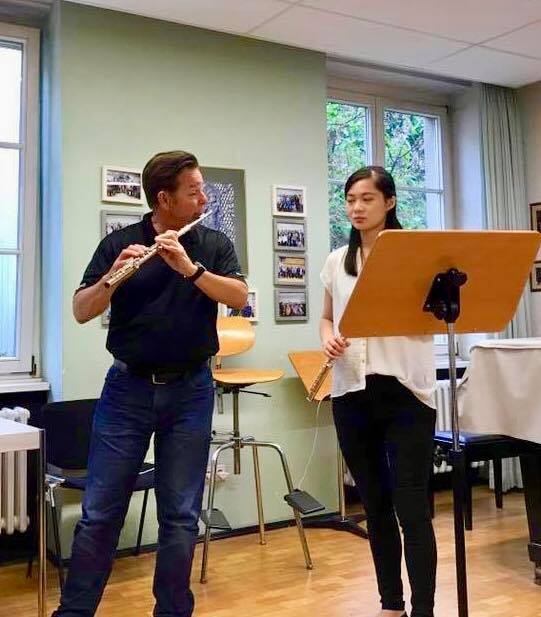
photo: Facebook, last week
Among the accusations cited by cincinnati.com, a former UC professor also told investigators he witnessed Garner’s sexual misconduct with students, including videos of Garner having sexual relations with two students…. Garner set up a hidden camera and secretly filmed himself having sexual relations with students, former CCM adjunct professor Randy Bowman told investigators. Bowman said Garner showed him two of the videos.
Garner, a well-known virtuoso, is reported to be on the teaching staff at Queens College, NY, and at Juilliard’s pre-college division. He confirms that information on his Facebook page.

The issue of sexual harrassment is of intense concern in Cincinnati, which is the home town of the deposed Met conductor, James Levine.
Read more here.
The critics have given the new show a distinctly lukewarm reception.
But the ROH website follows its usual practice in collecting only positive reactions from its twitter feed.
Did no tweeter say anything disobliging?
Read tweets here.
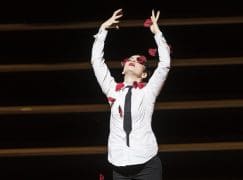
photo: ROH/Bill Cooper
After all the hype for Covent Garden’s new Carmen, the morning-after reviews are decidedly mixed.
David Gutman in The Stage calls it a ‘heartless, sometimes brilliantly theatrical, staging.’ He adds: ‘Carmen retains an androgynous look until the final scene imprisons her in a florid gown.’
Mark Valencia in What’s On Stage condemns Kosky’s ‘215-minute vanity project’. He writes: ‘Neither does it give me any pleasure to lament the Royal Opera’s questionable casting for its new flagship production. Anna Goryachova has an attractive, full-bodied mezzo but her Carmen was indecipherable and her intonation wayward. However, it is not her fault that the production’s antics allow for zero sexual chemistry with Francesco Meli.’
David Nice in theartsdesk.com: ‘Part of the problem in this first-cast airing of Kosky’s show at the Royal Opera – it was first seen in Frankfurt in 2016 – is a dramatically weak Don José. Francesco Meli’s is a strenuous, unhoneyed tenor voice: good, at least, for the more brutish later stages. As a character, this José is grim and wooden. Kosky isn’t interested in making him sympathetic. Yes, we know from Merimée’s novella that the Basque outsider has a violent history by the time of his fatal meeting with Carmen in Seville. Should that make him a cold psychopath, though, totally unresponsive to Micaëla, the girl who brings him news of his mother?’
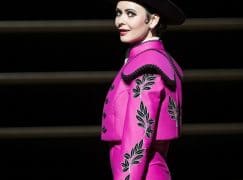
photo: Bill Cooper/ROH
UPDATE: First of the national newspapers –
Rupert Christiansen writes in the Telegraph: One great virtue of Barrie Kosky’s new staging, imported from Frankfurt, is that it has shaken my complacency – it is certainly different. But being different is not quite enough, and I felt increasingly dissatisfied as the evening progressed….
There is much musical material, excised from the standard editions, that I hadn’t previously heard – notably another entrance aria for Carmen, a comic aria for Moralès, and a much longer duet for José and Micaela. Some of this is delightful, some better left in the library. The spoken dialogue is replaced by an off-stage narration, using French text mostly drawn from the opera’s source in Mérimée’s novella. It’s all electrically alive, fresh, witty, energised and provocative.
Gradually, however, as so often with Kosky’s work, it loses steam: the first two acts last nearly two hours, and there is less new music to keep one alert.
Tim Ashley in the Guardian:Barrie Kosky’s new Royal Opera production of Carmen hails from Frankfurt, where it was first seen in June last year. It’s a curious staging, shot through with flashes of brilliance, though by no means cohering into a musical or dramatic whole.
As one might expect, Kosky aspires to postmodern radicalism. He has largely dispensed with Spain, apart from a few flounced frocks and matador uniforms. Don’t expect a tobacco factory or cigarette girls smoking, or indeed anything that smacks of particularly French naturalism.
Richard Morrison in the Times: There’s a disconcerting dichotomy in Kosky’s concept, however. While Goryachova’s Carmen and Kostas Smoriginas’s caricature glamour boy Escamillo are clearly meta-theatrical figures — ironic characters who know they are play-acting — it’s evident that Francesco Meli’s Don José and Kristina Mkhitaryan’s Micaëla come from the conventional operatic world of ardent passions and pathos. Kosky attempts to make drama out of the clash between the styles, but it’s not always convincing.
The pianist Anastassiya Dranchuk, facing expulsion to Kazakhstan, has won a reprieve thanks to a huge publicity campaign and the intervention of Berlin senator Andreas Geisel.
Anastassiya, 29, is relieved. She has lived legally in Germany for 17 years. The further absurdity is that both of her parents have full German citizenship.
Read here.

Message received:
Bournemouth Symphony Orchestra becomes the first symphony orchestra in the world to
have a professional ensemble led by disabled musicians as a core part of its activities
Following auditions in November 2017, the Bournemouth Symphony Orchestra today announces the six founding musicians of its new disabled-led ensemble; Siobhan Clough(violin/ viola), Phillip Howells (percussion), Roger Preston (cello), Kate Risdon (flute), Matthew Scott (clarinet) and Charlotte White (LinnStrument).
The six disabled musicians chosen to be part of the ensemble are all of professional standard. Three of the ensemble studied at London conservatoires (Guildhall, Trinity Laban and Royal Academy of Music) and Siobhan Clough (violin/viola) is currently in her third year at the RAM. BSO’s ensemble will become a permanent part of the Orchestra’s output, and the musicians will be given performance opportunities, professional development, and will be paid professional rates. They will have the opportunity to perform not only as a standalone ensemble but also alongside the BSO who will be learning new skills and accommodating the needs of the ensemble players and their disabilities.
These musicians will be working alongside the ensemble conductor James Rose as well as Alexander Campkin, the ensemble’s Composer-in-Residence, and Lucy Hale, the ensemble’s Young Composer-in-Association.
A name for the ensemble will be announced in due course.
Dougie Scarfe, CEO of the BSO, said “The BSO is delighted to welcome these incredibly talented musicians to the ensemble. I am extremely proud that the BSO is the first Orchestra in the world to have a professional disabled-led ensemble as a core part of its activities. I know that this new BSO ensemble will help promote diversity within the arts and society as a whole, making music more accessible to everyone.”
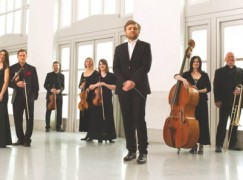
The so-called ‘grand finalists’ in this week’s Singapore Violin Competition are all students of jury members:
Chisa Kitagawa, Japan – a student of juror Takashi Shimizu
Sergei Dogadin, Russia – a student of juror Boris Kuschnir
Oleksandr Korniev, Ukraine – a teaching assistant at YST Conservatory in Singapore and past student of Qian Zhou, chair of jury
Dogadin (pictured) has already been helped by Kuschnir to win two other prizes.
The result hardly matters.
What does mater is that 30 young violinists have been enticed to enter the Singapore contest under false pretences. They should hire a lawyer and sue for the return of their expenses.
They would be setting an important precedent.
